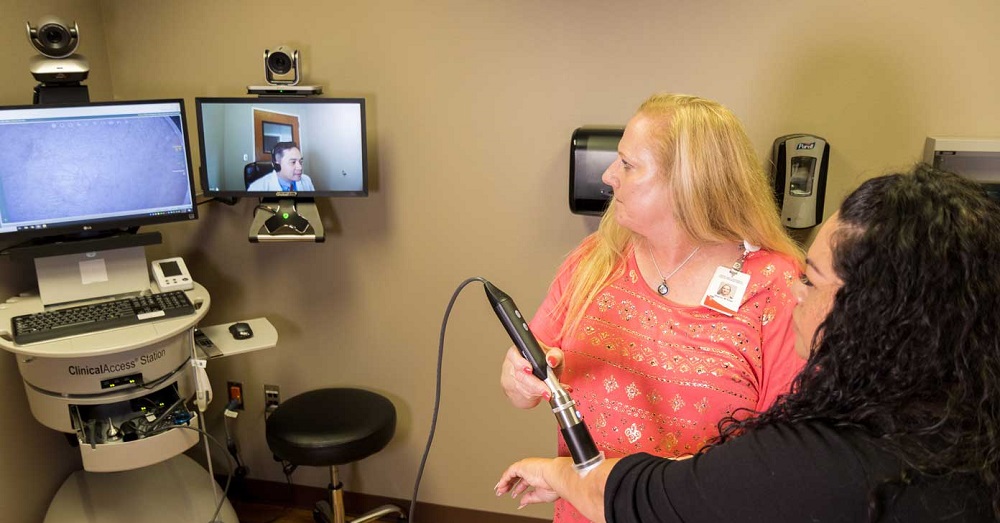From House Calls to Virtual Visits
COVID-19 Pandemic Led to Patients, Health Care Providers Turning to Telemedicine

Texas Tech Physicians has completed more than 160,000 telehealth visits since the start of the pandemic
The use of telemedicine soared during the COVID-19 pandemic. Texas Tech Physicians primary and specialty clinics across West Texas have completed more than 160,000 telehealth visits since the start of the pandemic. To compare, after launching telemedicine initiatives in 1989, Texas Tech University Health Sciences Center (TTUHSC) completed 50,000 telemedicine consultations between 1990 and April 2020.
“Telemedicine is direct clinical care by a health care provider to a patient at a distance through virtual or electronic means,” Ariel Santos, M.D., MPH, acute care surgeon for Texas Tech Physicians and director of the TTUHSC Telemedicine Program, said. “Telemedicine, telehealth and digital health are all used interchangeably. However, telehealth is a much broader umbrella which includes telemedicine and other modalities of communications, such as wearable devices and consumer and other health education.”
The COVID-19 pandemic might be at a “transition point,” according to the World Health Organization, but patients have come to expect their health care providers to offer virtual visits even after the pandemic is over.
“Telemedicine could be used by everyone from pediatrics to geriatrics,” Santos said. “I initially thought this would be a hit only among millennials since they are very equipped digitally. However, a study [by the AARP] showed that even older populations that we thought because of the digital divide would struggle with telemedicine, they love it.”
He added that people in remote areas have embraced telemedicine as well, especially when it comes to access mental health care.
“Telemedicine revolutionized delivery of behavioral health,” Santos said. “Psychiatry and mental health care providers are the leading users of this modality.”
Of the 108 counties in the TTUHSC service region, 20 have no practicing physician and 11 have no physician, nurse practitioner or physician assistant. Outside urban centers there are very few specialty providers, resulting in many patients traveling long distances to seek medical care.
Physicians in multiple specialties such as nephrology, cardiology, pulmonology, dermatology, infectious diseases, pediatrics and obstetrics/gynecology use telemedicine in areas where there is a shortage of specialists. In the case of burn patients who might have difficulty traveling to see a specialist in Lubbock, TTUHSC physician specialists use telemedicine to provide care in El Paso, Texas.
Patients are encouraged to ask their primary health care provider if telemedicine through their personal mobile device or computer is an option.
“Many of our patients have to travel long distances for their appointments,” Santos said. “They can be taken care of in their locality and save the cost associated with travel. It’s also a greener option as well.”
In addition, patients don’t have to miss work and they could save money on child care if necessary.
“Telemedicine is not a replacement for current health care — I want to talk to my patient and examine them — but it is a bridge to make health care more accessible,” Santos said.
Related Stories
The John Wayne Cancer Foundation Surgical Oncology Fellowship Program at Texas Tech University Health Sciences Center Announced
TTUHSC is collaborating with the John Wayne Cancer Foundation and has established the Big Cure Endowment, which supports the university’s efforts to reduce cancer incidence and increase survivability of people in rural and underserved areas.
Making Mental Health a Priority in the New Year
Sarah Mallard Wakefield, M.D., a psychiatrist with Texas Tech Physicians, talks about strategies to combat widespread and growing anxiety.
TTUHSC Dean to be Inducted into the National Academies of Practice as Distinguished Fellow
Gerard E. Carrino, Ph.D., MPH, dean of the TTUHSC Julia Jones Matthews School of Population and Public Health, will be inducted into the National Academies of Practice (NAP) as a Distinguished Fellow of the Public Health Academy.
Recent Stories
The John Wayne Cancer Foundation Surgical Oncology Fellowship Program at Texas Tech University Health Sciences Center Announced
TTUHSC is collaborating with the John Wayne Cancer Foundation and has established the Big Cure Endowment, which supports the university’s efforts to reduce cancer incidence and increase survivability of people in rural and underserved areas.
TTUHSC Receives $1 Million Gift from Amarillo National Bank to Expand and Enhance Pediatric Care in the Panhandle
TTUHSC School of Medicine leaders accepted a $1 million philanthropic gift from Amarillo National Bank on Tuesday (Feb. 10), marking a transformational investment in pediatric care for the Texas Panhandle.
Texas Tech University Health Sciences Center Permian Basin Announces Pediatric Residency Program Gift
TTUHSC Permian Basin, along with the Permian Strategic Partnership and the Scharbauer Foundation, Feb. 5 announced a gift that will fund a new pediatric residency.
